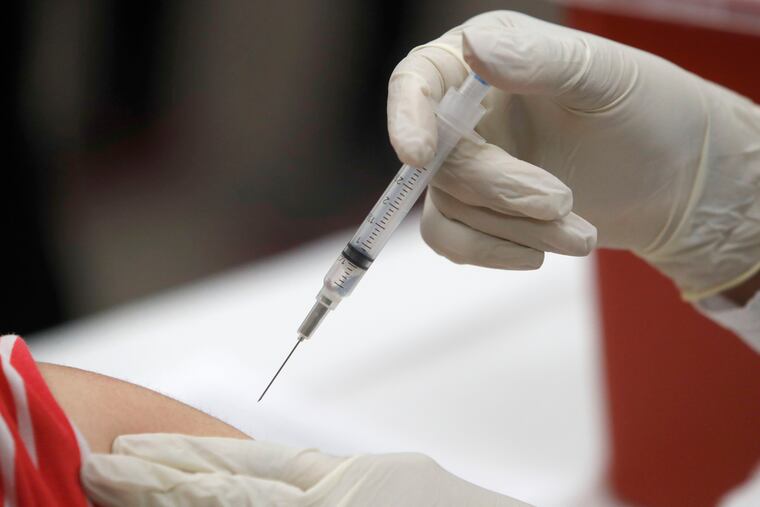Some colleges across the U.S. put new vaccine mandates in place — for the flu
As universities continue to weather the pandemic, they’re also preparing for a flu season that some health experts predict will be more severe than normal.

After a pandemic-disrupted year of safety measures and Zoom lectures, the promise of coronavirus vaccines offered U.S. universities a shot at normalcy this fall. The virus has not been wiped completely from campuses, but major outbreaks have so far been rare.
The arrival of flu season, however, poses an added challenge.
Colleges are ideal breeding grounds for viruses, and some public health experts are predicting that this year’s flu season will be more severe than the last. To guard against outbreaks, a number of major universities are going beyond their usual autumn flu vaccine pushes — and enacting mandates.
At Johns Hopkins University, which will enforce flu vaccine mandates for students, faculty and staff alike, one prime concern was that if a flu outbreak were to hit campus, students with flu symptoms could mistake it for COVID-19 and overwhelm testing sites.
“Making the influenza vaccine mandatory was, I would say, a straightforward decision based on all of those considerations,” said Stephen Gange, the university’s executive vice provost for academic affairs and a professor in its Bloomberg School of Public Health. “I think people see the value in trying to control the flu, given that we’re still in a high level of COVID transmission.”
» READ MORE: Free tuition, anyone? What local universities are doing to entice or punish students around COVID-19 protocols.
Health experts expected the confluence of the coronavirus and flu to spur a “twindemic” — severe outbreaks of the two viruses at once — last year.
But “very few people had the flu last year, because everybody was home trying to avoid COVID and everybody was wearing a mask,” explained Ranit Mishori, Georgetown University’s chief public health officer. Millions of people who avoided exposure to the flu last year may have weakened immunity, Mishori said, because their bodies did not create the barriers needed to fight the virus.
Now, with students back on campuses and many Americans back at work, experts are warning that the dangerous flu season that was predicted for 2020 will finally take hold.
“The expectation is that … this year, potentially, is going to be harsher,” Mishori said.
Georgetown has already had to contend with two viral outbreaks this year, including 65 confirmed cases of influenza A on the main campus and at the medical center, according to the university’s student newspaper, the Hoya.
“That fits with what we had expected … lower population immunity, early rates of infection,” Mishori said of the flu cases. “What we did to address this expectation is we created two early — earlier than usual — vaccine clinics for students.”
The Northwest Washington campus will not enforce a vaccine mandate, but officials are urging students and employees to get their shots.
“College students are more open to hearing these messages because of COVID,” Mishori said. “Students are very willing to get vaccinated.”
Influenza vaccination rates among college students typically are about 50 percent, according to survey data from the American College Health Association — but the number of students who reported having had a flu shot within the previous 12 months shot up to 61 percent in 2020 as the pandemic raged.
» READ MORE: Should colleges mandate COVID vaccines for the fall semester? | Pro/Con (from August)
This year, college health officials want that percentage to be even higher. Besides Johns Hopkins, schools such as the University of Miami and Maryland’s McDaniel College, as well as the entire University of California system, have all mandated flu shots.
Elon University, in North Carolina, will enforce a mandate for the second year in a row, said Jana Lynn Patterson, associate vice president for student life and dean of students.
“Our number of positive cases just plummeted,” Patterson said of last year’s flu season, by which point much of Elon’s student body had already returned to campus.
Elon’s students this year will have to prove they’ve received their flu shots by Oct. 29, a deadline scheduled to precede Thanksgiving break. “That’s always a vulnerable time for us, when they leave and come back,” Patterson said.
George Mason University, in Northern Virginia, required residential students to get the flu shot last year, when officials were concerned about overwhelming the campus’ coronavirus testing infrastructure.
But this year, with coronavirus vaccines available and more robust on-campus testing, “there’s less of a reason to mandate the flu vaccine than there was last year,” said Stephen Wintermeyer, the university’s associate medical director of student health services.
George Mason leaders instead are running flu vaccine clinics and strongly encouraging students and employees to get their shots, Wintermeyer said. And officials hope that pandemic-era policies of mask-wearing, regular handwashing, and staying home while sick will ward off flu outbreaks, too.
“In general, students have taken things very seriously,” Wintermeyer said. “I think people are more aware of transmitting viruses than they were in the past.”